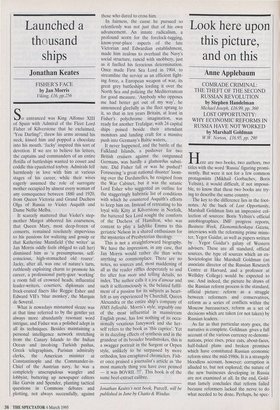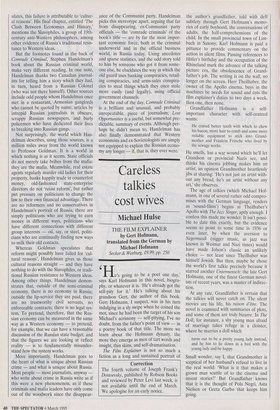Look here upon this picture, and on this
Anne Applebaum
COMRADE CRIMINAL: THE THEFT OF THE SECOND RUSSIAN REVOLUTION by Stephen Handelman Michael Joseph, £16.99, pp. 360 LOST OPPORTUNITY: WHY ECONOMIC REFORMS IN RUSSIA HAVE NOT WORKED by Marshall Goldman W. W. Norton, £16.95, pp. 290 H ere are two books, two authors, two titles with the word 'Russia' figuring promi- nently. But were it not for a few common protagonists (Mikhail Gorbachev, Boris Yeltsin), it would difficult, if not impossi- ble, to know that these two books are try- ing to describe the same country.
The key to the difference lies in the foot- notes. At the back of Lost Opportunity, Marshall Goldman lists an impressive col- lection of sources; Boris Yeltsin's official autobiographies, IMF progress reports, Business Week, Ekonomicheskaya Gazeta, interviews with the reforming prime minis- ter, Yegor Gaidar, as well as papers written by Yegor Gaidar's galaxy of Western advisers. These are all standard, official sources, the type of sources which an ex- Sovietologist like Marshall Goldman (an associate director of the Russian Research Centre at Harvard, and a professor at Wellsley College) would be expected to use. And indeed, the picture he draws of the Russian reform process is the standard, official picture: reform as a struggle between reformers and conservatives, reform as a series of conflicts within the Moscow bureaucracy, reform as a set of decisions which are taken (or not taken) by Russian leaders.
As far as that particular story goes, the narrative is complete, Goldman gives a full account of the various currency re-denomi- nations, price rises, price cuts, about-faces, half-baked plans and broken promises which have constituted Russian economic reform since the mid-1980s. It is a strangely bloodless account, however: corruption is alluded to, but not explored; the nature of the new businesses developing in Russia are not examined at all, In the end, Gold- man lamely concludes that reform failed because reformers lacked the nerve to do what needed to be done. Perhaps, he spec-
ulates, this failure is attributable to 'cultur- al reasons'. His final chapter, entitled 'The Clash Between Economics and History,' mentions the Slavophiles, a group of 19th- century anti-Western philosophers, among other evidence of Russia's traditional resis- tance to Western ideas.
But the footnotes found in the back of Comrade Criminal, Stephen Handelman's book about the Russian criminal world, make very different reading. In one note, Handelman thanks two Canadian journal- ists for telling him a story which they had, in turn, heard from a Russian Colonel (who was not there himself). Other sources include odd people whom Handelman once met in a restaurant, Armenian ganglords who cannot be quoted by name, articles by intrepid Russian journalists in obscure, scrappy Russian newspapers, and burly policemen who have dedicated their lives to breaking into Russian gangs.
Not surprisingly, the world which Han- delman describes, using those sources, is a million miles away from the world known to Professor Goldman. It is a world in which nothing is as it seems. State officials do not merely take bribes from the mafia: they are the mafia. Meanwhile, real estate agents regularly murder old ladies for their property, banks happily trade in counterfeit money, old-fashioned state-enterprise directors do not 'resist reform', but rather put pressure on politicians to change the law to their own financial advantage. There are no reformers and no conservatives in Handelman's portrait of Russia, there are simply politicians who are trying to earn money in different ways, politicians who have different connections with different group interests — oil, say, or steel, politi- cians who are continually finding new ways to milk their old contacts.
Whereas Goldman speculates that reform might possibly have failed for 'cul- tural reasons', Handelman gives us those cultural reasons straight — and they have nothing to do with the Slavophiles, or tradi- tional Russian resistance to Western ideas. Among other things, Handelman demon- strates that, outside of the semi-criminal economy, there is no economy in Russia; outside the lip-service they are paid, there are no trustworthy civil servants, no enforceable contracts; there is no legal sys- tem. To pretend, therefore, that the Rus- sian economy can be measured in the same way as a Western economy — to pretend, for example, that we can have a reasonable discussion of the Russian state budget, and that the figures we are looking at reflect reality — is to fundamentally misunder- stand how the system works.
More importantly, Handelman goes to the heart of what is unique about Russian crime — and what is unique about Russia. Most people — most journalists, anyway who write about crime in Russia write as if this were a new phenomenon, as if these criminals and mafia leaders have only come out of the woodwork since the disappear-
ance of the Communist party. Handelman picks this stereotype apart, arguing that far from disappearing, ex-Communist party officials — the 'comrade criminals' of the book's title — are by far the most impor- tant economic force, both in the criminal underworld and in the official business world, in Russia today. Using anecdotes and sparse statistics, and the odd story told to him by someone who got it from some- one else, he elucidates the way in which the old guard uses banking conspiracies, retail- ing conspiracies, and arms-sales conspira- cies to steal things which they once stole more easily (and legally), using official government channels.
At the end of the day, Comrade Criminal is a brilliant and unusual, and probably unrepeatable, piece of journalism; Lost Opportunities is a useful, but somewhat pre- dictable, summary of events. Although per- haps he didn't mean to, Handelman has also finally demonstrated that Western economists and ex-Sovietologists are simply not equipped to explain the Russian econo- my any longer — if, that is, they ever were.



























































 Previous page
Previous page